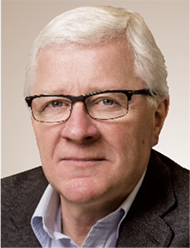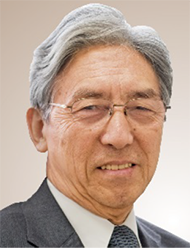The 2017 Keio Medical Science Prize Awardees
John E. Dick PhD FRS

Canada Research Chair in Stem Cell Biology and Senior Scientist, Princess Margaret Cancer Centre, University Health Network ; and Professor, Department of Molecular Genetics, University of Toronto
Reason for Selection
Identification of cancer stem cells
Tissue stem cells exhibit the capacity for self-renewal and differentiation into cells of various types. These multipotent stem cells are the principal source of the cells in adult tissue. The idea that stem cells might also be present in cancer tissues, i.e., the "cancer stem cell hypothesis," was first proposed long ago, but bona fide cancer stem cells were not isolated for many years. Professor John E. Dick was the first to isolate cells expressing hematopoietic stem cell surface markers from human leukemia cells, and transplant them into immunocompromised mice. This provided the first evidence that human leukemia can be maintained in mice, and the first indication that stem cells are present and active in leukemia. Beginning with these findings, the field of cancer stem cell research has continued to advance and it has since become clear that cancer stem cells play roles in solid tumors as well. Cancer stem cells are more resistant to therapeutic interventions than normal cancer cells, and serve as source cells in cancer recurrence and metastasis. Professor Dick 's contribution is immeasurable, as he gave rise to the idea that cancer stem cells must be destroyed for cancers to be eradicated.
Background
- 1974
- Registered Radiological Technologist, Misericordia General Hospital
- 1978
- B.Sc. (Hons) Dept. of Microbiology, University of Manitoba
- 1984
- Ph.D. Microbiology and Biochemistry, University of Manitoba
- 1978-1984
- Graduate Student, Dr. J. Wright, Department of Microbiology and Manitoba Institute of Cell Biology,niversity of Manitoba, NSERC Scholarship, MHRC Scholarship
- 1984-1986
- Post-doctoral Fellow, Dr. A. Bernstein, Ontario Cancer Institute and Mount Sinai Hospital, Research Institute, University of Toronto MRC Post-doctoral Fellowship
- 1986-1991
- Scientist, Department of Genetics, Research Institute Hospital for Sick Children, Toronto
- 1987-1991
- Assistant Professor, Department of Molecular and Medical Genetics, University of Toronto, Toronto
- 1989-1996
- Research Scientist of the National Cancer Institute of Canada
- 1991-1995
- Associate Professor, Department of Molecular and Medical Genetics, University of Toronto
- 1991-2002
- Senior Scientist, Department of Genetics, Research Institute, Hospital for Sick Children, Toronto
- 1995-Present
- Professor, Department of Molecular Genetics, University of Toronto
- 1996-2001
- Medical Research Council of Canada Scientist
- 2002-Present
- Canada Research Chair in Stem Cell Biology, Senior Scientist, Princess Margaret Cancer Centre, University Health Network, Toronto
- 2007-Present
- Investigator, McEwen Centre for Regenerative Medicine, University Health Network, Toronto
- 2007-2017
- Director, Program in Cancer Stem Cells, Ontario Institute for Cancer Research, (OICR), Toronto
- 2017-Present
- Director, Translational Research Initiative in Leukemia, Ontario Institute for Cancer Research, (OICR), Toronto
Comments
It is with gratitude that I accept the Keio Medical Science Prize. Science is not done in isolation and I have had the good fortune to be surrounded by wonderful colleagues in Toronto who set the highest standards for scientific thought that continuously challenged me to tackle biological challenges with rigour and clear thinking. All of our work on the biology of normal and leukemic human stem cells was the cumulative effort of many students and post-docs who contributed so much to the thinking and execution of the experimental findings. I dedicate this award to them.
Seiji Ogawa, Ph D

Research Professor, Kansei Fukushi Research Center, Tohoku Fukushi University
Reason for Selection
Development of functional MRI
Professor Seiji Ogawa developed a technique for detecting MRI (Magnetic Resonance Imaging) signals that depends on blood oxygenation levels in the brain, which he named BOLD (for Blood Oxygen Level Dependent). Professor Ogawa has shown that BOLD signals can be used in functional mapping of the human brain following sensory stimulation, establishing the basic principles underlying functional MRI (fMRI). fMRI in turn has paved the way to the mapping of human brain activity non-invasively and without the use of radioactive isotopes. The ability to measure whole brain activity, which enables the investigation of distributed patterns of activity as well as functional localization of the brain, is one of key advantages of fMRI. New applications of fMRI, such as decoding of brain activity and identification of biomarkers of neuropsychiatric disease, continue to be developed. Professor Ogawa's pioneering work on fMRI is a milestone technology that plays indispensable roles in contemporary neuroscience.
Background
- 1957
- B.S., Applied Physics University of Tokyo, Tokyo, Japan
- 1967
- PhD in Chemistry, Stanford University, Stanford, California, USA
- 1962 - 1964
- Research Associate, Radiation Research Laboratories
Mellon Institute, Pittsburgh, PA - 1967 -1968
- Postdoctoral Fellow, Stanford University, Stanford, CA
- 1968-1983
- Member of the Technical Staff Principal Investigator, Biophysics Research
Bell Laboratories, AT&T, Murray Hill, NJ - 1984-2001
- Distinguished Member of the Technical Staff, Biophysics Research/Biological Computation Research Bell Laboratories, AT&T/ Lucent Technologies, Murray Hill, NJ
- 2001-2004
- Visiting Professor, Biophysics/Physiology Department Albert Einstein College of Medicine, Yeshiva University Bronx, New York
- 2001-2008
- Director, Ogawa Laboratories for Brain Function Research Hamano Life Science Research Foundation, Tokyo, Japan
- 2008-present
- Professor (special appointment), Kansei Fukushi Research Center, Tohoku Fukushi University, Sendai, Japan
- 2008-2012
- Visiting Professor, Graduate School of Human Relations, Keio University, Tokyo, Japan
- 2008-2013
- Visiting Professor, Neuroscience Research Institute, Gachon University, Incheon, Korea
- 2009-2016
- Visiting Professor, Biophysics/Physiology Department Albert Einstein College of Medicine, Yeshiva University, Bronx, New York
- 2011-2015
- R&D Advisor, National Institute of Information and Communication Technology
Comments
It is a great honor to receive the prestigious Keio Medical Science Prize and to join the ranks of the renowned previous laureates. The MRI phenomenon I encountered during my fundamental research a quarter of century ago has seen applications in brain science far beyond my expectations at the time. The successful development of the neuro-imaging field is the product of efforts by great many talented scientists around the world.
